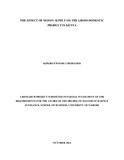| dc.description.abstract | There are a number of theories illustrating the relationship between money supply and gross
domestic product. Money supply can be defined as the total stock of money circulating in the
economy. The circulating money involves the currency, printed notes, money in the deposit
accounts and in the form of other liquid assets. Valuation of the money supply helps analysts and
policy makers to frame the policy or to alter the existing policy of increasing or reducing the
supply of money. The valuation is important as it ultimately affects the business cycles and
thereby affects the economy. This study sought to provide answers to the question, what are the
effect of money supply on the gross domestic product in Kenya.
The study undertook a causal research design. This study used time series data from the period
1970 to 2012 to critically investigate the relationship between public money supply and
economic growth by establishing an empirical relationship that exists between them.
Macroeconomic data included labour force, government investment, domestic credit, nominal
money supply, interest rate, money supply outstanding and economic growth. The study
employed the Engle and Granger Co-integration test and the Granger causality test under the
error correction framework.
The results indicate the existence of a significant long-run relationship between money supply
and economic growth as measured by GDP. Additionally, all the variables except investment
were insignificant in the short run. Therefore, current public money supply is sustainable. The
study further reveals that all the variables used except economic growth, were significant
determinants of money supply in Kenya. The findings also reveal that money supply in the
country has been increasing significantly over the period under review. Correlation analysis of
economic growth rate and money supply at 5 percent level of significance reveals that money
supply negatively influence economic growth. This also indicates mopping of excess money
from the economy leads to economic growth. Regression analysis show that money supply lead
to 0.1839 (p = 0.0465) increase in economic growth. | en_US |

